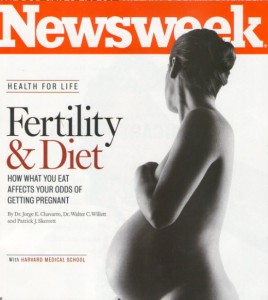new to the gluten free journey?
new to the gluten free journey?
 This study demonstrates how gluten sensitivity can contribute to infertility and other obstetrical and gynecological problems. Celiac patients who were not compliant with a gluten free diet presented with “delayed menarche, secondary amenorrhea, a higher percentage of spontaneous abortions, anemia and hypoalbuminemia.” Gluten free diet compliance led to normal pregnancies. The author of the study goes on to say that gluten sensitivity should be screened for in women presenting with reproductive disorders.
This study demonstrates how gluten sensitivity can contribute to infertility and other obstetrical and gynecological problems. Celiac patients who were not compliant with a gluten free diet presented with “delayed menarche, secondary amenorrhea, a higher percentage of spontaneous abortions, anemia and hypoalbuminemia.” Gluten free diet compliance led to normal pregnancies. The author of the study goes on to say that gluten sensitivity should be screened for in women presenting with reproductive disorders.
Contents
ToggleStay up-to-date with the latest articles, tips, recipes and more.

*These statements have not been evaluated by the Food and Drug Administration. This product is not intended to diagnose, treat, cure or prevent any disease.
If you are pregnant, nursing, taking medication, or have a medical condition, consult your physician before using this product.
The entire contents of this website are based upon the opinions of Peter Osborne, unless otherwise noted. Individual articles are based upon the opinions of the respective author, who retains copyright as marked. The information on this website is not intended to replace a one-on-one relationship with a qualified health care professional and is not intended as medical advice. It is intended as a sharing of knowledge and information from the research and experience of Peter Osborne and his community. Peter Osborne encourages you to make your own health care decisions based upon your research and in partnership with a qualified health care professional.
9 Responses
Really, really good information. Thanks for your insight into this difficult subject. I’ve signed up for your feed and looking forward to the next update. Thank You
I have been to your site before. The more I visit, the more I keep coming back! 🙂
Thanks for this information. Just wanted to point out that the link to the source in broken.
Jenny,
Checked the links. They are working. Let us know if you have any more problems. Thanks for posting.
(I figured out I was gluten sensitive at age 45 after being very sick for a very long time).
I had ovarian cysts and wacky hormones from the start. First pregnancy went okay and then I had three late first trimester spontaneous abortions. Broke my heart more each time. Then I had two more kids, one more miscarriage, and a fourth child. All kids have been ill and all are gluten sensitive and now on GF diets. Years ago when my doctor sent me to a specialist about the multiple miscarriages the woman OBGYN came in the room, didn’t even look at me, called me a “habitual aborter” and said that IF I got pregnant again I had a more than 50% chance of miscarrying. I never went back to her (that was right before I got pregnant with kid #2) because all she did was briefly scare me, until I got out into the parking lot (sobbing) and suddenly realized the woman had no idea what was going on with me and was just going by the numbers and her experience. Years later my naturopath explained that it was likely from malabsorption of nutrients from long-term gut damage. I dutifully took my prenatal vitamins and very good care of myself, but had no idea what was wrong. Three of my kids are girls and I’m grateful that they’re all getting better and maybe won’t have the same problems I did (my mom had 3 miscarriages as well, and is gluten sensitive).
I’m a Celiac and I have PCOS. I was misdiagnosed with IBS for 15 years before I was finally tested for Celiac. Once I received the diagnosis of Celiac Disease my infertility issues seemed to make sense. We have had one successful pregnancy producing a healthy and allergy-free toddler!
After trying to get pregnant for more than 18 years with a dozen surgeries, medications, injections, several cycles of IUI and five miscarriages, we finally adopted our children. I wasn’t diagnosed with Celiac for 15 more years. It is comforting to know WHY I was not able to have biological children. “Unexplained infertility” was a hard diagnosis to accept in the 1980’s.
Keeping a healthy diet, and exercising frequently will help you stay fertile and healthy as possible.
Several treatments for low sperm count, Ayurveda, allopathy, homeopathic, I come to know I failed, but in past,
20years daily I use to eat wheat bread at night, so gluten presence ruined me, unexplainable infertility with me
Thanks for above information